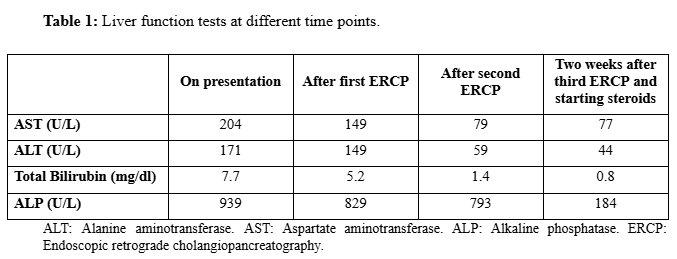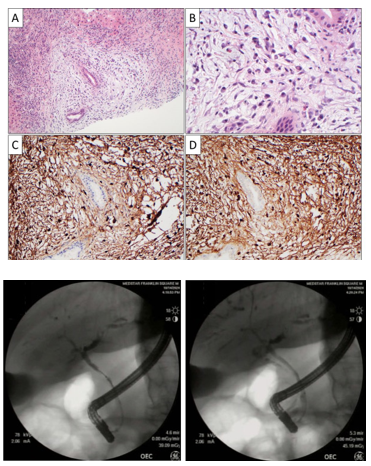Monday Poster Session
Category: Biliary/Pancreas
P2386 - IgG4-Related Sclerosing Cholangitis Masquerading as Cholangiocarcinoma: A Diagnostic Challenge
Monday, October 27, 2025
10:30 AM - 4:00 PM PDT
Location: Exhibit Hall

Shahem Abbarh, MD (he/him/his)
Georgetown University MedStar Health
Baltimore, WA
Presenting Author(s)
Shahem Abbarh, MD1, Yusuf Omar Hallak, MD2, Bisher Sawaf, MD3, Muhamad Oum, MD4, Mohammed Abu-Rumaileh, MD2, Betul Sannah, MD5, Radhika Vij, MD6, Abhinav Sankineni, MD6, Obada Daaboul, MD7, Muaz Alsabbagh, MD8, Amine Rakab, MD9
1Georgetown University MedStar Health, Baltimore, WA; 2The University of Toledo, Toledo, OH; 3University of Toledo Medical Center, Toledo, OH; 4Saint Agnes Medical Center, Fresno CA, Fresno, CA; 5Bursa Uludag University School of Medicine, Istanbul, Istanbul, Turkey; 6MedStar Georgetown University Hospital, Baltimore, WA; 7Southern Illinois University, Springfield, IL; 8Detroit Medical Center/Wayne State University, Cleveland, OH; 9Division of Medical Education, Weill Cornell Medicine, Doha, Ad Dawhah, Qatar
Introduction: IgG4-related sclerosing cholangitis (IgG4-SC) is a rare autoimmune biliary disease linked to IgG4-related disease (IgG4-RD), often presenting with obstructive jaundice. While most cases are associated with autoimmune pancreatitis, isolated IgG4-SC lacks pancreatic involvement and mimics conditions like PSC or cholangiocarcinoma, complicating diagnosis. We report a case initially misdiagnosed as cholangiocarcinoma, later correctly identified as isolated IgG4-SC, preventing unnecessary treatment.
Case Description/
Methods: An 80-year-old man presented with a 1-week history of jaundice and fatigue associated with pale stools and dark urine. He also reported unintentional weight loss of approximately 20 kg and loss of appetite over the past year. Labs showed cholestatic liver enzyme elevation and high CA19-9 (920 U/mL). Imaging revealed intrahepatic bile duct strictures with abrupt obstruction at the liver hilum without extrahepatic involvement. ERCP showed malignant-appearing strictures in the left and right intrahepatic branches, biliary stenting led to LFT improvement, but cytology was inconclusive. Initial diagnosis was cholangiocarcinoma and the patient was deemed ineligible for surgical resection given his locally advanced disease. He was planned for chemotherapy with possible radiation therapy. However, PET/CT was negative for FDG-avid lesions, prompting further work-up. Elevated serum IgG4 (1011 mg/dL) and liver biopsy showed storiform fibrosis and IgG4-positive plasma cells confirmed IgG4-related sclerosing cholangitis. He improved with corticosteroid therapy.
Discussion: IgG4-SC is a rare fibroinflammatory disease that mimics cholangiocarcinoma and primary sclerosing cholangitis, making diagnosis challenging—especially in isolated cases without pancreatic involvement. Most IgG4-SC cases are associated with autoimmune pancreatitis, with isolated disease accounting for less than 10%. Diagnostic criteria include the HISORt and Japan Biliary Association guidelines, incorporating imaging, serology, histology, and steroid response. Elevated serum IgG4 supports the diagnosis but lacks specificity. ERCP with IDUS, POCS, and bile duct biopsy are key to distinguishing IgG4-SC from malignancy. Histology shows IgG4-positive plasma cells, storiform fibrosis, and obliterative phlebitis. Corticosteroids are the mainstay of treatment, often yielding rapid remission. Our case underscores the importance of early recognition and steroid initiation to avoid misdiagnosis and unnecessary oncologic therapy.

Figure: Figure 1 - Hematoxylin and eosin staining (X100) demonstrates bile ducts with concentric periductal fibrosis (A). High power view (X400) shows increased plasma cell in storiform-like fibrosis adjacent to the portal triad (B). Anti-IgG (C) and anti-IgG4 (D) immunostaining shows IgG and IgG4 positive cells. IgG4 +/IgG+ ration is greater than 40%.
Figure 2 - Endoscopic retrograde cholangiopancreatography (ERCP) showing multiple diffuse biliary strictures of malignant appearance in the right and left intrahepatic branches.

Figure: Table 1 - Liver function tests at different time points
Disclosures:
Shahem Abbarh indicated no relevant financial relationships.
Yusuf Omar Hallak indicated no relevant financial relationships.
Bisher Sawaf indicated no relevant financial relationships.
Muhamad Oum indicated no relevant financial relationships.
Mohammed Abu-Rumaileh indicated no relevant financial relationships.
Betul Sannah indicated no relevant financial relationships.
Radhika Vij indicated no relevant financial relationships.
Abhinav Sankineni indicated no relevant financial relationships.
Obada Daaboul indicated no relevant financial relationships.
Muaz Alsabbagh indicated no relevant financial relationships.
Amine Rakab indicated no relevant financial relationships.
Shahem Abbarh, MD1, Yusuf Omar Hallak, MD2, Bisher Sawaf, MD3, Muhamad Oum, MD4, Mohammed Abu-Rumaileh, MD2, Betul Sannah, MD5, Radhika Vij, MD6, Abhinav Sankineni, MD6, Obada Daaboul, MD7, Muaz Alsabbagh, MD8, Amine Rakab, MD9. P2386 - IgG4-Related Sclerosing Cholangitis Masquerading as Cholangiocarcinoma: A Diagnostic Challenge, ACG 2025 Annual Scientific Meeting Abstracts. Phoenix, AZ: American College of Gastroenterology.
1Georgetown University MedStar Health, Baltimore, WA; 2The University of Toledo, Toledo, OH; 3University of Toledo Medical Center, Toledo, OH; 4Saint Agnes Medical Center, Fresno CA, Fresno, CA; 5Bursa Uludag University School of Medicine, Istanbul, Istanbul, Turkey; 6MedStar Georgetown University Hospital, Baltimore, WA; 7Southern Illinois University, Springfield, IL; 8Detroit Medical Center/Wayne State University, Cleveland, OH; 9Division of Medical Education, Weill Cornell Medicine, Doha, Ad Dawhah, Qatar
Introduction: IgG4-related sclerosing cholangitis (IgG4-SC) is a rare autoimmune biliary disease linked to IgG4-related disease (IgG4-RD), often presenting with obstructive jaundice. While most cases are associated with autoimmune pancreatitis, isolated IgG4-SC lacks pancreatic involvement and mimics conditions like PSC or cholangiocarcinoma, complicating diagnosis. We report a case initially misdiagnosed as cholangiocarcinoma, later correctly identified as isolated IgG4-SC, preventing unnecessary treatment.
Case Description/
Methods: An 80-year-old man presented with a 1-week history of jaundice and fatigue associated with pale stools and dark urine. He also reported unintentional weight loss of approximately 20 kg and loss of appetite over the past year. Labs showed cholestatic liver enzyme elevation and high CA19-9 (920 U/mL). Imaging revealed intrahepatic bile duct strictures with abrupt obstruction at the liver hilum without extrahepatic involvement. ERCP showed malignant-appearing strictures in the left and right intrahepatic branches, biliary stenting led to LFT improvement, but cytology was inconclusive. Initial diagnosis was cholangiocarcinoma and the patient was deemed ineligible for surgical resection given his locally advanced disease. He was planned for chemotherapy with possible radiation therapy. However, PET/CT was negative for FDG-avid lesions, prompting further work-up. Elevated serum IgG4 (1011 mg/dL) and liver biopsy showed storiform fibrosis and IgG4-positive plasma cells confirmed IgG4-related sclerosing cholangitis. He improved with corticosteroid therapy.
Discussion: IgG4-SC is a rare fibroinflammatory disease that mimics cholangiocarcinoma and primary sclerosing cholangitis, making diagnosis challenging—especially in isolated cases without pancreatic involvement. Most IgG4-SC cases are associated with autoimmune pancreatitis, with isolated disease accounting for less than 10%. Diagnostic criteria include the HISORt and Japan Biliary Association guidelines, incorporating imaging, serology, histology, and steroid response. Elevated serum IgG4 supports the diagnosis but lacks specificity. ERCP with IDUS, POCS, and bile duct biopsy are key to distinguishing IgG4-SC from malignancy. Histology shows IgG4-positive plasma cells, storiform fibrosis, and obliterative phlebitis. Corticosteroids are the mainstay of treatment, often yielding rapid remission. Our case underscores the importance of early recognition and steroid initiation to avoid misdiagnosis and unnecessary oncologic therapy.

Figure: Figure 1 - Hematoxylin and eosin staining (X100) demonstrates bile ducts with concentric periductal fibrosis (A). High power view (X400) shows increased plasma cell in storiform-like fibrosis adjacent to the portal triad (B). Anti-IgG (C) and anti-IgG4 (D) immunostaining shows IgG and IgG4 positive cells. IgG4 +/IgG+ ration is greater than 40%.
Figure 2 - Endoscopic retrograde cholangiopancreatography (ERCP) showing multiple diffuse biliary strictures of malignant appearance in the right and left intrahepatic branches.

Figure: Table 1 - Liver function tests at different time points
Disclosures:
Shahem Abbarh indicated no relevant financial relationships.
Yusuf Omar Hallak indicated no relevant financial relationships.
Bisher Sawaf indicated no relevant financial relationships.
Muhamad Oum indicated no relevant financial relationships.
Mohammed Abu-Rumaileh indicated no relevant financial relationships.
Betul Sannah indicated no relevant financial relationships.
Radhika Vij indicated no relevant financial relationships.
Abhinav Sankineni indicated no relevant financial relationships.
Obada Daaboul indicated no relevant financial relationships.
Muaz Alsabbagh indicated no relevant financial relationships.
Amine Rakab indicated no relevant financial relationships.
Shahem Abbarh, MD1, Yusuf Omar Hallak, MD2, Bisher Sawaf, MD3, Muhamad Oum, MD4, Mohammed Abu-Rumaileh, MD2, Betul Sannah, MD5, Radhika Vij, MD6, Abhinav Sankineni, MD6, Obada Daaboul, MD7, Muaz Alsabbagh, MD8, Amine Rakab, MD9. P2386 - IgG4-Related Sclerosing Cholangitis Masquerading as Cholangiocarcinoma: A Diagnostic Challenge, ACG 2025 Annual Scientific Meeting Abstracts. Phoenix, AZ: American College of Gastroenterology.
